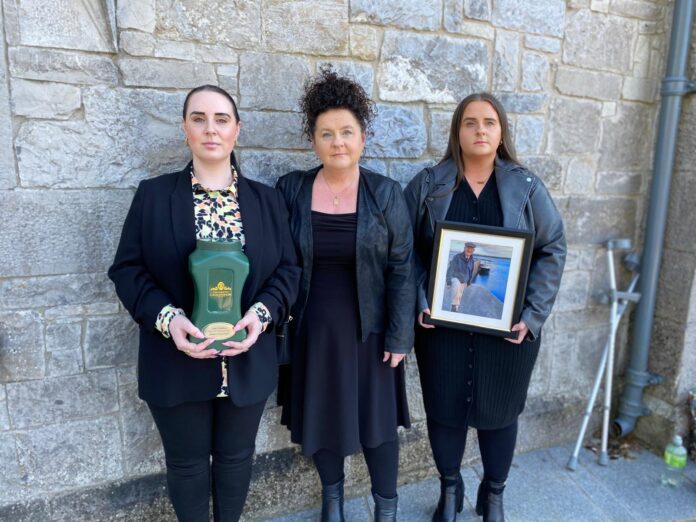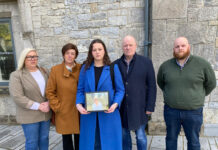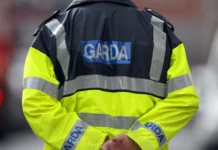
THE DAUGHTER of an 83-year-old man who walked into an ambulance unaided but died in hospital broke down as she told the Coroner’s Court, sitting in Kilmallock, that she found him choking on his own phlegm.
John O’Halloran’s daughter, Wilma O’Halloran, carried the urn containing her father’s ashes into the witness box to give her deposition before the inquest into his death in Kilmallock courthouse.
She told the court that her father suffered a fall at home on February 7, 2022, but was able to walk into the ambulance himself to go to hospital.
In the emergency department at University Hospital Limerick, he was diagnosed as having suffered a fracture to his neck vertebra.
When Ms O’Halloran was allowed to visit her father on February 9, he was in the trauma unit and had been lying flat, wearing a neck brace, since his arrival.
“He was coughing and choking on his own phlegm. His face was covered in green phlegm. I got some tissues and tried to clean his face … I was shocked at his state and that he was left there, unattended,” she told the court.
“He had no access to a bell. He was not on a drip. He complained of being thirsty and dehydrated and told me the nursing staff were scarce on the ward.”
When she visited again on February 10, Wilma said she found her father distressed and asking to be discharged.
“I was shocked to see my father still lying flat … and now with weights and saline bottles on either side to stop him moving,” she said.
She told the coroner that a consultant orthopaedic surgeon, Mr James Hepburn, told her and that her father would be operated on in the Mater Hospital in Dublin and, while his recovery would be slow, there would be “nothing to worry about”.
“I never knew that would be the last time I heard my father’s voice and my last conversation with him,” she said.
Ms O’Halloran said that her father was a fit and exceptionally active man, who loved golfing, walking, and fishing and had won awards for his garden at his home in Cahercalla in Ennis, County Clare.
He was also a carer to his wife, Mary, now also deceased, who was wheelchair-bound and suffering from dementia – a duty Wilma took over after her father’s death.
It was decided that John would be transferred to a specialist unit in the Mater Hospital to have surgery.
Nursing staff gave evidence and depositions that they had been concerned that John was aspirating – inhaling mucus and spittle while lying flat – and also that he was agitated, sitting up and trying to get out of the bed.
Doctors ordered that he should receive “nil by mouth”, but the inquest heard that, after that decision, he was still given oral medication and a sedative on the day before suffering a cardiac arrest on February 11.
He was resusitated after 26 minutes without oxygen and was moved to the ICU where he remained unconscious. Following scans and tests, life support was stopped and he died on February 22.
Giving his deposition, Mr Hepburn did not agree with solicitor for the O’Halloran family, Scarlett Griffin O’Sullivan of Callan Tansey Solicitors, that after being given a sedative while confined to lying flat, with concerns about aspiration, Mr O’Halloran should have been admitted to the High Dependency Unit.
He told the inquest that in requiring John be kept flat, he was acting on the advice of the surgical team in the Mater.
“A cervical spine injury is very serious and very dangerous to manage,” he said, adding that allowing him to move could cause further damage, paralysis, or even death.
Allowing that there was a danger that he might inhale fluids lying flat, Mr Hepburn said it was “a difficult balance”.
The pathologist who performed the autopsy on Mr O’Halloran could not be present at the inquest. In her place, consultant pathologist Dr Marcel Stast said the examination revealed a number of underlying issues and that pneumonia as a result of aspiration was a “minor” contributory cause of death.
Denise Mulcachy BL, representing the hospital, said that it was “clear’ that Mr O’Halloran’s death was due to “multi-factorial” elements.
Extending his sympathy to the family, coroner John McNamara said his verdict was based “on the facts and the evidence available to us”.
He returned a narrative verdict based on the facts as the cause of death.
Afterwards, Ms O’Halloran said she was “grateful to the coroner” for giving her family an opportunity to hear what had been done in her father’s care.
She said the family believe they have had some answers, “and I thank the coroner for endorsing the recommendations we asked for. Hopefully they will be my father’s legacy.”
Ms Griffin O’Sullivan read the recommendations for the inquest, which were that a “nil by mouth” order should be clearly communicated to staff and patient’s families with signs at the patient’s bedside; that there be early intervention for spinal patients who are at risk of, or suspected of, having difficulty in swallowing; and that there be clear documentation and communication of feeding and care plans for patients under spinal precautions.
The family also want an internal hospital review of what happened in her father’s case to be reopened in light of the inquest.










